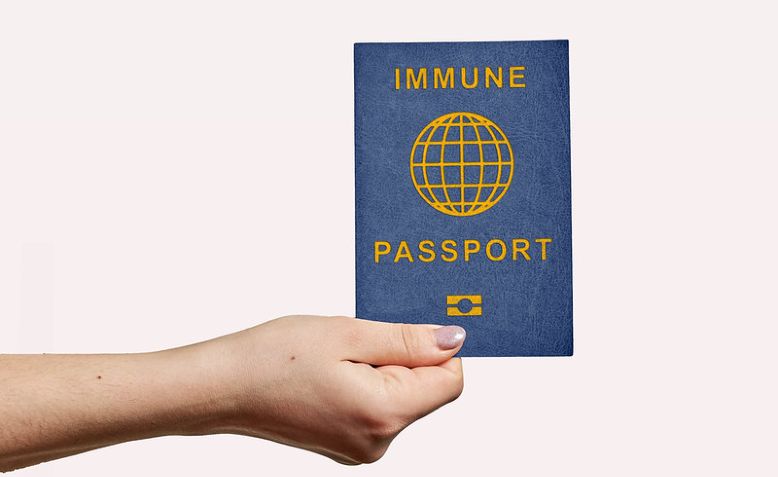 Immune passport Photo: Marco Verch / cropped from original / licensed under CC 2.0, licence and original photo linked at the bottom of article
Immune passport Photo: Marco Verch / cropped from original / licensed under CC 2.0, licence and original photo linked at the bottom of article
Boris Johnson’s vaccine passport strategy is a bad idea which won’t stop a third wave, argues Terina Hine
At yesterday’s Downing Street press conference Boris Johnson was eager to paint a sunny picture of the road ahead: covid cases, hospitalisations and deaths are falling, vaccinations increasing and the pub beckoning. But moments into the Q&A it became clear that more is needed than a £2.6 million revamp on the communications room to enable the PM to be an effective communicator.
Johnson failed to answer simple questions and pretended to be confused by what he was being asked, while refusing to admit to what was printed in his own cabinet report – but for all his obscuration, the shadow of vaccine passports stole the show.
Only a few months ago the idea of Covid passports was dismissed by No 10, but not wishing to waste the eight pilot schemes the government has funded, it appears the passport out of lockdown will indeed be a passport.
We have been told to expect a third wave – all modelling points to it as the effects of social mixing outpaces the vaccine. There is considerable uncertainty around how severe the wave will be, but one thing that is certain – wave or no wave Johnson wants an end to social distancing and other mitigating measures.
Evidence from Chile has provided a warning – a highly effective vaccine strategy (third most successful in the world after Israel and the UAE) with rapid relaxation of restrictions has resulted in a catastrophic outbreak of the virus and an overwhelmed health service.
Hence government scientific advisors are suggesting social distancing measures be maintained for another year, something the PM refuses to do. “He wants to get life back to normal,” a senior government figure told Sky News, “So he’s prepared to go for the certification.”
At present we have 7% of the population fully vaccinated and roughly 46% have received one dose, so there is still some way to go before we can assume herd immunity.
The introduction of passports (or Covid status certificates as the government prefers to call them) is being directly linked to lifting of other covid restrictions – most notably the social distancing one/two metre rule. Business is keen to use such documents to allow a return to normal working practices in factories and offices as well as entertainment venues (including pubs and clubs) which would then be free to operate at full capacity.
The passports proposed will potentially be loaded with personal health data – a photo app on your smart phone linked to your NHS data. Though in an attempt to downplay this possibility, Downing Street has suggested it could be open to allowing venues to set their own certification criteria – what could possibly go wrong?
At the briefing Johnson sidestepped the question as to whether a vote would be taken in parliament on the passport, and although today ministers have said a vote would take place, it remains to be seen whether it would be required if the state simply permitted the use of certificates, rather than legislating for them. Civil liberty questions remain either way.
The fear is that the passports denote an introduction of ID cards by stealth and a move towards compulsory vaccinations. Vaccine passports would lead to a two-tier society, with the creation of a subclass of citizens made up of communities where vaccine take-up is low – the poor, minority ethnic groups and migrants – as well as those unable to get vaccinated – the disabled, the young and pregnant women.
The way to promote mass take-up of the vaccine is to educate not coerce. When the Victorians made vaccinations compulsory with fines and prosecutions the result was mass protests and the emergence of the National Anti-Vaccination League. Today forced vaccinations are prohibited by law and the UK has some of the highest vaccination up-take in Europe. Compulsion only leads to mistrust.
The way to ensure marginalised groups are included in public health measures is to engage and communicate, not to exclude them further by creating a checkpoint society.
The way to restrict new variants spreading in the UK would be to have more effective rules for the 20,000 people arriving at our ports each day (including 8,000 tourists) rather than preventing pregnant women from going to the theatre or young people to the pub.
If the government wanted to prevent or limit the expected third wave, vaccine passports are not the answer. Instead, they should be providing resources to support isolation, to ventilate schools and workplaces, to improve public health communication, and effective border measures and quarantine. Investing in a discriminatory government database will lead to an eradication of rights rather than the elimination of disease.

